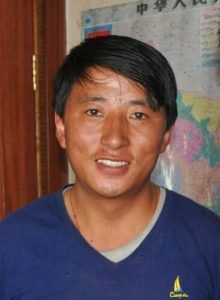 It’s all over the international news: Tashi Wangchuk, a young 31-year-old Tibetan who advocates for greater Tibetan language education in schools, has been detained by the Chinese authorities since January 27 this year in Yushu, Qinghai Province, in western China.
It’s all over the international news: Tashi Wangchuk, a young 31-year-old Tibetan who advocates for greater Tibetan language education in schools, has been detained by the Chinese authorities since January 27 this year in Yushu, Qinghai Province, in western China.
The case against Tashi arose after his interviews with the New York Times, which brought to light Tashi Wangchuk’s campaigning work to ensure that the Tibetan language was taught all across Tibet. He also appeared in a nine-minute documentary on the newspaper’s website, which followed Tashi to Beijing, where he was trying to file a lawsuit against officials in Yushu County to voice his concerns that his niece and other Tibetan children would not reach fluency in their native language following the forced cancellation of Tibetan classes in a local monastery. The video also showed how no law firm was willing to take on his lawsuit, and media outlets refused to report on his case at the time of release.
A month later he was arrested and was denied access to both a lawyer and his family, who were not informed of his detention until March 24. This was all for a man who wrote about the disintegration of the Tibetan language among younger Tibetans and urged governments in the region to adopt true bilingual education.
Tashi has been charged with the crime of “inciting separatism” and could face up to 15 years in prison if found guilty. Sadly, the statistics are not in his favour as China’s 90 percent conviction rate means that he is likely to be imprisoned. In China, inciting separatism is seen as a serious political charge, which is manipulated to silence people from ethnic minority groups like Tibetans who are deemed troublemakers by officials.
Liang Xiaojun, Tashi’s lawyer, informs that the case has entered a new phase, and the Chinese police officers are pushing for court trial, having completed an investigation requested by the prosecutors, who now have about 90 days to decide whether the case should go to court. “I met Tashi in the detention centre for more than one hour. Tashi was doing well. He thinks that what he did wasn’t wrong. Tashi said he had had no intention of inciting separatism. All he wants is to try to preserve Tibetan culture,” said Liang.
Ironically, Tashi has no known record of advocating Tibetan independence or separatism, and has never commented on the Chinese occupation of Tibet and called instead for greater regional autonomy, especially in language use and education. In fact, he’s even praised Chinese President Xi Jinping.
It takes advocates like Tashi being detained to draw attention to the plight of the many political prisoners there are in Tibet whom nobody hears about because of the lack of international media attention. In April, Amnesty International urged people to call on the Chinese government to “immediately and unconditionally” release Tashi. Today, the Free Tibet campaign and international human rights groups and Tibet advocacy groups are joining hands to fight for Tashi, with petitions being signed, pressure being put by world governments, and over 2,000 supporters taking action and writing to their Foreign Ministers to intervene. Only time can tell what his fate has in store for him.




 Print
Print Email
Email